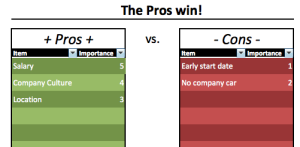I always wanted to know more about investment banking as an undergrad. The work, the ambition it requires, and the thought of being around a bunch of intelligent, hard-working individuals attracted me.
Then I took a different path and studied English in college instead of finance. But, although I wouldn’t seriously consider pursuing this field now like I did before, investment banking is still fascinating to me.
So when I thought of interesting and successful people to interview for you, I knew I had to text this guy I know at an investment bank and see what comes of it.
Fortunate for us, this investment banker agreed to slice out time from his busy schedule to do the interview with me, as long as it remained anonymous.
I wasn’t surprised about his one condition to go anonymous, because it’s pretty typical for Wall Street and the big banks to dislike attaching their name to anything. And I believe you readers gain more raw information and honesty because this person had the freedom to share without holding back.
Personally, I work less hours but cram more work into those hours (let’s say 75-80 hours) than some of my bulge bracket friends (90 hours, but more down time). It really varies. The best thing someone can do when exploring banks to go to is find the right fit for them, figure out how you operate, and choose a bank that fits. Otherwise, you will be MISERABLE.
So from me to you, it doesn’t matter if you’re convinced you’re working in investment banking or a completely unrelated field. This is an excellent read, regardless. Trust me.
——
Brian: What are the career benefits of working in investment banking?
Investment banking is a really great start to your career in finance. It teaches you to work hard and how to value a company and determine the best strategic option for the company. It also teaches you how to succeed in a competitive environment, and there really is never a dull day.
As far as long-term career benefits, it is the most flexible option you can have. Every field of finance values the skill set that investment banking provides and makes investment bankers highly sought after candidates for jobs ranging from private equity to corporate finance.
Brian: And some of the negatives or sacrifices?
Sacrifice is the name of the game. I’ve been working at the job for 6 months. It’s like being a doctor; you’re always on call, your social life comes second, and hobbies go out the window. Those looking at working in the industry have to be prepared for 80-100 hour weeks regularly, all nighters and having to miss concerts and other gatherings with friends in order to hammer out pitch books on the weekend.
That’s not to say it’s all bad, as the compensation helps make it worth it. You do have to work like some kid is trying to take your spot (which is true) and do as your boss says, as there isn’t much room for creativity as other fields.
Brian: I read about the 100 hour work weeks as an investment banker. Do all the hours require intelligent, focused work or do some of the total hours include just being there at the office, doing busy work?
It really depends. There’s different levels of investment banking banks: bulge brackets (Goldman Sachs, Bank of America Merrill Lynch, Citigroup, etc.), middle market banks (William Blair, Raymond James, Houlihan Lokey, etc.) and boutiques (Everhill, Greencore, Moelis, etc.). Hours can differ by type of bank, and especially by type of group (real estate, consumer, healthcare, FIG, consumer, etc.).
Personally, I work less hours but cram more work into those hours (let’s say 75-80 hours) than some of my bulge bracket friends (90 hours, but more down time). It really varies. The best thing someone can do when exploring banks to go to is find the right fit for them, figure out how you operate and pick a bank that fits. Otherwise, you will be MISERABLE.
Banks are working on “junior banking initiatives” to improve work life balance. Citigroup has Saturday’s off (unless you are on a live deal), JP Morgan offers a “protected” weekend once a month (phone out of pocket).
Brian: How crucial is it to know what you’re doing on Excel as a banker?
It definitely, definitely helps. It makes your job so much easier. When your job is easier, you work faster and make your boss happier. It definitely is not required though. I would say get some experience with different functions in college or take a Wall Street Prep excel course if you want to make yourself a better candidate.
Brian: What type of personalities, traits, or background do you think lead to people entering and excelling as an investment banker?
I think ambition plays a huge role, as well as an appreciation for hard work. I’ve always strived to challenge myself, and investment banking is definitely one of the most challenging fields coming out of college.
If you can’t imagine working more than 8 hours a day, then this field is not for you. For me, I don’t mind putting in work and bettering my skillset for 80 hours a week. It is definitely not for everyone, but those who are ambitious and continually look to push themselves should look into investment banking.
Brian: What are the action steps you would give to an undergrad who wants to break into this field?
As far as studies go, being a business major obviously helps but isn’t a requirement. If you don’t study finance, get involved with some sort of finance club on campus. It also helps to take a financial modeling class if your school does not already have one.
Also, make sure you’re a well-rounded person. Investment banks love seeing that you’ve worked in a team before, so clubs sports or things like debate teams are held in high regard. It is also important to work somewhere that’s not just your local pool’s snack stand during the summers. I worked for free at a family friend’s business, and that experience helped me in my interviews. And lastly, research the field. Make sure this is what you want to do before giving it your all and trying to break in.
Brian: Can you tell me as much as you can about the investment banking interview process?
Selection
As far as selection for interviews, I’ll break this down into two different sections: target schools vs. non-target schools
Target Schools
These are your schools with a strong business school as well as alumni network in investment banking/Wall Street (Ivy League, Michigan, NYU, Notre Dame, Indiana, etc.). Biggest thing at these schools is differentiating yourself from the pack but also getting your foot in the door. GPA is highly regarded; some banks will barely look at you if you don’t have a 3.5. GPA doesn’t make it impossible though, as I did not have the greatest GPA in college. Networking with alumni, talking to people who work at the banks, and crushing those interviews are very important. These banks have been recruiting at your schools for years so they know everyone is smart; they want to see who wants it badly enough and who has taken initiative to make their dreams a reality.
Non-Target Schools
The biggest difference here is the standards are raised. You need to keep your GPA high (above 3.5) and network your ass off. That means reaching out through your sister’s ex-boyfriend’s brother to get contacts at some of these banks. That means maybe paying your own way to get to Chicago or New York to meet people for coffee and become more than just a piece of paper. It is much harder, but not impossible, to break in.
The Interview
There are a few things that investment bankers look at:
1. KNOW YOUR RESUME
When I had my first interview, I thought I knew my resume backwards and forwards. I do not work at that bank. You do the math there.
2. Technical Questions
The dreaded technical questions. Honestly this is just a checklist and a way to see how you work under pressure. Look online for investment banking question guides to prepare yourself. Know how to walk through a DCF, how depreciation flows through the 3 statements, how to value a company, debt vs. equity, different valuation multiples. And if you don’t know the answer, walk your way through what you know with the interviewer and where you would look for the answer. NEVER guess.
This sort of goes with knowing your resume. Practice in the mirror telling your story, how you came to investment banking, and what you have done to break into the field.
4. Research the company
Another bank I did not know the CEOs name, which didn’t help my status. Don’t do a deep dive but have something to talk about when they ask if you have any questions.
Overall, you have to be comfortable in there. These interviewers will only hire kids they like, kids they can see themselves working with for long hours every week. Relax, treat the room like a conversation, and ask intelligent questions at the end. If there are two interviewers, split your questions among the two and make sure you address each person with your answers. Also, when interviewing at specific banks, ask around or research to see if they ask certain technicals in order to prepare yourself accordingly.
Brian: What’s the most insane story you’ve heard on Wall Street involving a co-worker, analyst at another bank, client, or deal?
As far as deals go, A coworker had a friend who had to fly to Germany and drop off a pitchbooks for a meeting. He literally flew there (working the whole time on the plane, naturally), met his boss in the airport with the books, and flew home.
Another kid had to stay up two nights in a row (60 hours) to finish up a presentation to give to the group internally. As soon as the lights went off for the PowerPoint presentation, everyone in the room heard a THUD. The kid had immediately fallen asleep when the lights went off (he’s ok, no issues there).
Deal closing/holiday parties are also pretty awesome. Everyone is just blowing off steam, you get to drink with some of the older guys and hear their Wall Street stories from “the good old days”, awkward coworker hookups and money being spent in large quantities.
Brian: How prevalent is cocaine in investment banking? I imagine the crazy work hours, high stress, and sleep deprivation make cocaine a desirable drug for some.
It’s honestly not that prevalent, as the risk just far outweighs the reward. I know kids who do it outside of work (investment banking provides you a lot of cash to spend). I’d say Adderall would be more prevalent but even that isn’t used much. Coffee, Red Bull, 5 hour energy drinks are huge.
Brian: If you had to give an estimate based on your anecdotal evidence, what’s the percentage of jerks on Wall Street? And why do you think this is so?
It really depends. Bulge brackets overall the industry views as having more “jerks” then middle market where culture is more valued. But it’s really on a group by group basis. It’s an industry full of highly ambitious individuals, so some bosses with ride their analysts so that they can impress their own bosses in turn.
This ambition, coupled with some people thinking money makes them better than people, really makes some people assholes, but there are assholes in literally every industry. So I would say 20% are assholes but many are congregated at the bulge bracket level vs. middle market level.
Brian: Any last words you want to share?
If this investment banking is truly what you want, don’t ever give up. I was rejected countless times before getting anything when I went through recruiting. Keep having faith in yourself, and keep pushing and grinding to get your opportunity.
——
I personally loved this interview. The honesty, insight, and advice about working in investment banking came out in a phenomenal fashion.
Since the majority of readers don’t go to target schools, I want to focus on and reiterate what this investment banker said about it being harder to land an offer from a non-target school, but not impossible.
If you do find yourself in this position, it’s possible if you’re extra prepared and go above and beyond target school students.
By this, I mean you need to be ready with answers to overcome objections about your school, GPA, or work ethic. And in the job search you have to hustle harder by being more persistent than anyone else and getting creative to find connections.
For example, ask your university’s alumni office if they have a list of alumni in banking. Find contact information for investment bankers on their firm’s website. Or call the firm’s main line and ask to speak to a specific associate, VP, or someone in hiring. If you can’t find an email, investigate the firm’s email format (like first name and last name @bankname.com, or first initial and last name @bankname.com) and use the name of the person you want to contact in that same format.
If you don’t do these things and more, you have virtually no shot compared to someone at a target school like Harvard or Penn.
And reread the last answer in the interview if you’re serious about working in investment banking. Because I agree that the opportunity is there if you really want it.
When you know what you want and why you want it, that’s enough motivation to power you to find a way.
Are you interested in working in investment banking? Do you want to know more about what does an investment banker do? If so, comment below and I’ll do a follow-up piece.




I’ve been thinking about getting out into investment banking for a while now. I am fairly knowledge on finances and the stock market and think that I can do well within the field. Granted, I know that I would still need to go to school for a while before I can do it.
What do you personally like about investment banking? And if you don’t mind me asking, how old are you and what are you currently pursuing?